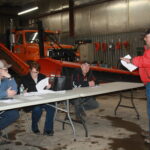MAPLETON, Maine – John Edgecomb, town manager of Mapleton, Chapman and Castle Hill, said he’s pleased the tri-town residents’ response to the recently-completed revaluation was both just and fair.
“Our ultimate goal was to make the taxes as fair as possible,” he said.
A revaluation is the process of performing all of the necessary market analysis and valuation steps to determine accurate and equitable values for all properties within a municipality. The equalization of the values within a city or town creates a fair distribution of the tax burden. The purpose of a revaluation is not to raise taxes, but to create an equitable distribution of the tax load.
Before the process was completed, the total real estate valuation of Mapleton was $49,394,300, while now its $76,624,000. Chapman was $12,483,500, and now is $16,055,900, and Castle Hill was $9,980,400 and is now $14,343,100.
Edgecomb said he saw “the sales ratio slipping” eight years ago, and knew a revaluation would be forthcoming.
“Four years ago we saw the sales ratio dropping much more dramatically,” he said, “and in September 2005, the boards of selectmen and assessors agreed to undertake the tax revaluation process. They knew we needed to do something.”
Lewis Cousins, the assessors’ agent, assisted the town’s consultant, Marilyn Currie, and they began revaluating homes in the three communities.
“A detailed analysis of recent sales data clearly proved where the assessments needed updating,” said Cousins, noting that without question, land and the newer, nicer homes were undervalued.
“The result of the revaluation was a shift in taxes from the modest homes to the newer homes and nicer homes,” Edgecomb said.
Once the revaluation was completed and the tax bills were sent out, Edgecomb said about one-third of the population saw an increase in their taxes, one-third stayed about the same, and one-third saw a reduction.
The town manager said 1,900 properties were revalued. Mapleton accounts for 1,300 properties, while Chapman and Castle Hill have about 300 each.
“Of the 1,900 properties, we only had 20 abatements, or assessing adjustments,” said Edgecomb. “Once we saw that an adjustment needed to be made, we processed the abatement and a few weeks later the residents got a check.”
While people may not have been happy that their tax bills increased, Edgecomb said property owners were cooperative.
“Everyone knew how detailed the revaluation work was,” he said, “and most seemed satisfied with the thoroughness of the job.”
Edgecomb said after the revaluation, the land value on house lots changed from $3,500 to $7,500 to $18,000, while wood lots went from $200 to $300 an acre, and farmland went from $400 to $500 per acre.
Subsequently the towns’ mill rates have been affected by the revaluation.
Mapleton’s mill rate went from 19.3 to 13.8, Castle Hill went from 19.4 to 14.8, and Chapman’s mill dropped from 19.2 to 15.9.
Lewis said the communities are now all in compliance in terms of the state-assessed certified sales ratio.
“Mapleton is now at 92 percent, whereas the year prior to the revaluation, it was 58 percent,” he said. “Chapman went from 58 percent to nearly 100 percent, and Castle Hill went from the low 80s to nearly 100 percent.”
“Our goal is to stay near 100 percent,” said Edgecomb, noting that the new computer software used to calculate the revaluations is very “assessor friendly.”
“You don’t have to be a computer guru to work with the software,” he said. “Because of the software, we can analyze our information easier and in better detail. This will allow us to stay in touch with the real values better.”
Edgecomb said since not all properties in the Mapleton area were visited, Cousins will spend the next few years working on making additional adjustments.
“We did not do a site visit everywhere,” said Edgecomb, “but over the next three years, we should be able to have updated records on all properties in Mapleton, Chapman and Castle Hill.”
Property owners are encouraged to keep the Town Office abreast of any changes they make on their property in the meantime.
The last time a revaluation was done in the three communities was 1987.
Presque Isle, ME
38
Rain
Houlton, ME
40
Rain
Caribou, ME
38
Rain
Fort Kent, ME
35
Clouds
Change Location
- Presque Isle
- Houlton
- Caribou
- Fort Kent
© 2024 Bangor Publishing Company.







